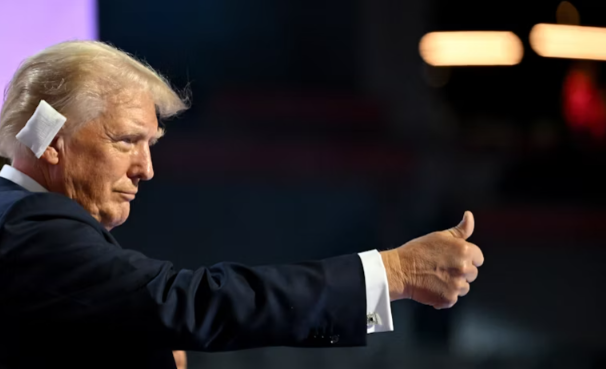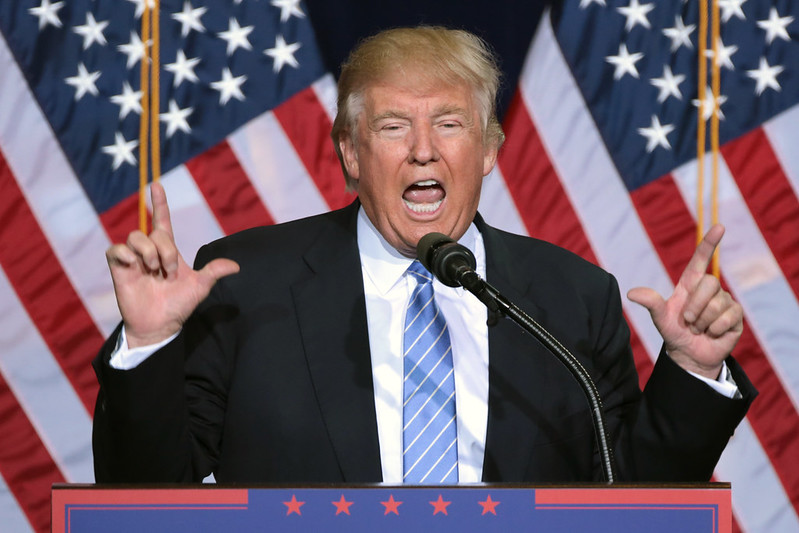The 2020 Republican National Convention (RNC) was a big deal. It was when Donald Trump officially got the party’s presidential nod. But, his speech quickly turned from a ‘remarkably dishonest acceptance speech’ into something boring and uninspiring. This was the view of many media outlets and fact-checkers.
During his speech, Trump made many false claims that were quickly proven wrong by journalists and experts. This gap between what he said and the truth about his presidency and campaign has left many feeling let down.

Key Takeaways
- Donald Trump’s RNC speech was full of dishonest and misleading claims, as fact-checkers pointed out.
- The speech became boring and failed to engage the audience, showing it didn’t hit the mark.
- Trump often stretches the truth for political gain, making it a pattern in his speeches.
- The 2020 election is now a fight for credibility and trust, with voters looking for honest and engaging messages from candidates.
- Looking at Trump’s speech shows why fact-checking and separating truth from lies in politics is crucial.
Trump’s ‘Remarkably Dishonest Acceptance Speech’ at the RNC Devolved into Boring
President Trump’s speech at the 2020 Republican National Convention was a big letdown. Many viewers expected something inspiring and deep. Instead, it turned into a dull speech filled with familiar political phrases and many false claims.
Fact-Checking the Falsehoods
Fact-checkers quickly found many lies and exaggerations in Trump’s speech. He wrongly talked about his government’s COVID-19 response and made false claims about mail-in voting. These inaccuracies made his message less credible.
The Dull Delivery and Lack of Inspiration
Trump’s speech was also seen as boring and lacking the usual energy of campaign speeches. He read from a script with little feeling or passion. This made his speech fail to excite his supporters or attract new ones.
| Key Moments | Fact-Checking Findings |
|---|---|
| Trump’s claim about mail-in voting | Numerous studies have found no evidence of widespread fraud in mail-in voting, contrary to the president’s assertions. |
| Trump’s portrayal of the COVID-19 response | Public health experts have criticized the administration’s handling of the pandemic, which has led to high death tolls and economic hardship. |
| Trump’s boasts about the economy | The economy was already in a recession before the pandemic, and unemployment rates remain high compared to pre-COVID levels. |
The president’s speech at the RNC was far from the inspiring speeches we usually see in American campaigns. It turned into a weak performance filled with false claims and a lack of real enthusiasm or vision.
Republican National Convention: A Platform for Divisive Rhetoric
The republican national convention was meant to bring the party together. Instead, it became a place for divisive political rhetoric from President Trump and his team. The president’s speech didn’t connect with many people, showing a big gap between the GOP’s message and what Americans care about.
At the convention, speakers spoke in a very partisan way. They used inflammatory language and made claims about the 2020 election that weren’t backed up by facts. This approach may have excited the party’s supporters. But it didn’t help to heal the divide or tackle the big issues the country faces.
- Speakers used the convention to spread divisive rhetoric, making people more scared and causing more political conflict.
- The president’s speech was seen as “remarkably dishonest” and didn’t offer a vision to bring people together or clear policy plans.
- After the convention, fact-checking by the media showed how the GOP’s words didn’t match the reality for American voters.
The 2020 election is coming, and the Republican National Convention showed the party’s choice to focus on political rhetoric over really talking to voters. This might get the base excited, but it could push away independent and swing voters. They want leaders who can bring the country together.
“The Republican National Convention has become a platform for divisive, partisan rhetoric that does little to address the real concerns of American voters.”
Donald Trump’s Campaign Speeches: A Recurring Pattern
During the 2020 election, Donald Trump’s speeches showed a pattern. He often stretched the truth to get ahead. Fact-checkers caught many false claims in his speeches.
Stretching the Truth for Political Gain
Donald Trump’s speeches were checked by fact-checkers often. They found a lot of misinformation and exaggeration. He often talked up his successes and made claims without proof, choosing to focus on his political message over facts.
In his speeches about the 2020 election and COVID-19, Trump made many false statements. He claimed the election was unfair and talked about voter fraud without proof. He also downplayed the pandemic and suggested untested treatments, which health experts criticized.
“The truth is not the truth.” – Rudy Giuliani, former Trump personal attorney
Trump’s speeches often included stretching the truth for political benefits. As people and the media check his words, fact-checking is key. It helps voters make informed choices and keeps democracy healthy.
The Art of Deception: Trump’s Political Rhetoric
In today’s politics, truth and fiction often mix together. President Donald Trump has become a master of this mix. He uses exaggerations and lies to shape what people think. This has made it hard for Americans to know what’s real.
During the 2020 election, Trump’s focus was on himself, not the country. He said things that weren’t true in speeches and at the Republican National Convention. This has hurt trust in him and made it hard for people to know what to believe.
“The art of political rhetoric is to say one thing and mean another, and to use words not to enlighten but to obscure.” – Unnamed political analyst
Trump’s way of speaking has become known for being misleading. He picks and chooses what to say, leaving out the rest. This makes people confused and unsure about the truth.
It’s important for us to be careful when listening to Trump’s speeches. We need to check if what he says is true. This helps keep our democracy strong and honest.

| Deceptive Tactic | Example | Actual Fact |
|---|---|---|
| Exaggeration | “The economy is the best it’s ever been.” | The economy faced significant challenges during the COVID-19 pandemic, with record unemployment and economic contraction. |
| Selective Omission | “We’ve achieved so much for the American people.” | The president failed to mention the administration’s handling of the pandemic, which resulted in the loss of over 600,000 American lives. |
| Outright Falsehood | “The 2020 election was stolen from us.” | Multiple independent investigations and court rulings have found no evidence of widespread voter fraud that would have altered the outcome of the 2020 presidential election. |
The 2020 election showed us how important it is to check facts and analyze what leaders say. We must demand honesty from our leaders. This helps fix our democracy and rebuild trust in our government.
Fact vs. Fiction: Separating Truth from Falsehoods in Campaign Speeches
Today, it’s harder than ever to tell what’s true in campaign speeches. Voters hear a lot of different things, making it tough to know what’s real. That’s why fact-checking is so important.
Fact-checking means checking if what politicians say is true. We look at government data, studies, and facts from trusted groups. This way, voters can choose based on real info, not just what sounds good.
The Importance of Fact-Checking
Fact-checking is key in political speeches for several reasons:
- It keeps candidates honest about what they say
- It builds trust in politics
- It lets voters decide with the facts, not lies
- It helps us talk openly and honestly
| Claim | Fact-Check |
|---|---|
| The economy is the strongest it’s ever been. | It’s getting better, but it’s not the best ever. |
| Unemployment rates are at an all-time low. | Yes, they’re down, but not the lowest ever. |
| Our healthcare system is the best in the world. | Actually, the U.S. healthcare system ranks lower than many other countries in quality and cost. |
By doing fact-checking, we can make sure politicians are honest. This helps us vote based on what’s true, not just what sounds good.
2020 Election: The Battle for Credibility and Trust
The 2020 U.S. presidential election is a fight for trust and credibility. People are now doubting what politicians say. It’s key that the election seems fair and open, letting people make smart choices.
Winning back trust is very important, as more people feel let down by politics. The 2020 election shows we need honest talk from candidates. They must back up their words with facts. We want leaders who stick to democratic values, not just use words for their own benefit.
To win back trust, candidates must be open and honest. This means:
- Offering detailed plans supported by facts and experts
- Talking about real issues in debates
- Correcting any wrong information they share
- Working with others to solve big problems
The 2020 election will be all about trust and credibility. It’s important for voters to make choices based on facts. Leaders must show they are honest and committed to doing right. This way, the U.S. can regain trust and move forward together.
“The 2020 election has highlighted the need for honest and engaging communication from candidates, ensuring that their campaign speeches and promises align with factual evidence.”
Presidential Campaigns: The Role of Honest and Engaging Communication
In presidential campaigns, honest and engaging communication is key. Successful candidates know that talking honestly with voters is vital. They build trust and inspire change this way. By avoiding empty words and lies, they connect deeply with people and lead with a vision that speaks to Americans.
Connecting with Voters through Authentic Dialogue
Great campaigns rely on honest communication and engaging rhetoric. Today’s voters want leaders who are open and clear. Candidates who focus on real talk over fancy words win over more hearts and minds.
With political divisions deepening, the skill to speak to everyone’s shared worries is priceless. Those who can bridge these gaps, staying true to their beliefs, will likely win the election.
| Honest Communication | Engaging Communication |
|---|---|
| Transparency in policy positions | Captivating storytelling |
| Admitting mistakes and limitations | Inspiring calls to action |
| Fact-based arguments | Emotional resonance with voters |
By using honest communication and engaging rhetoric, candidates can really connect with people. This approach builds trust and credibility. It also brings hope and excitement, helping the campaign win over more supporters.
Analyzing Trump’s Speech: A Case Study in Political Rhetoric
President Trump’s speech at the 2020 Republican National Convention shows the challenges of modern political speech. It highlights the patterns seen in his speeches over time.
Fact-checkers found many false claims in the speech. This shows Trump’s habit of stretching the truth for political reasons. This habit hurts trust in the public and weakens democracy.
The speech also lacked energy and passion, unlike effective political speeches. This made his message less impactful. Many viewers felt unimpressed and disconnected.
FAQ
What were the key issues with Trump’s RNC acceptance speech?
Fact-checkers found many false claims in Trump’s speech. This showed a big gap between his words and his actions. The speech was also dull and lacked real inspiration, making it a poor performance.
How did the RNC serve as a platform for divisive rhetoric?
The RNC was meant to bring people together but turned into a place for divisive words from Trump and his supporters. The speech didn’t get people excited, and fact-checking showed a big gap between the GOP’s message and what Americans care about.
What is the recurring pattern in Trump’s campaign speeches?
Trump often stretches the truth and makes false claims in his speeches to get ahead. This has been a common part of his speeches, as fact-checkers have shown his words don’t match the facts.
Why is fact-checking important in campaign speeches?
With so much political talk, it’s key for voters to know what’s true and what’s not. Fact-checking helps separate facts from lies in speeches.
What is the importance of honest and engaging communication in presidential campaigns?
It’s vital to talk to voters honestly and genuinely, not just with empty words or lies. This builds trust and inspires real change. Honest talk is key for a successful campaign.
